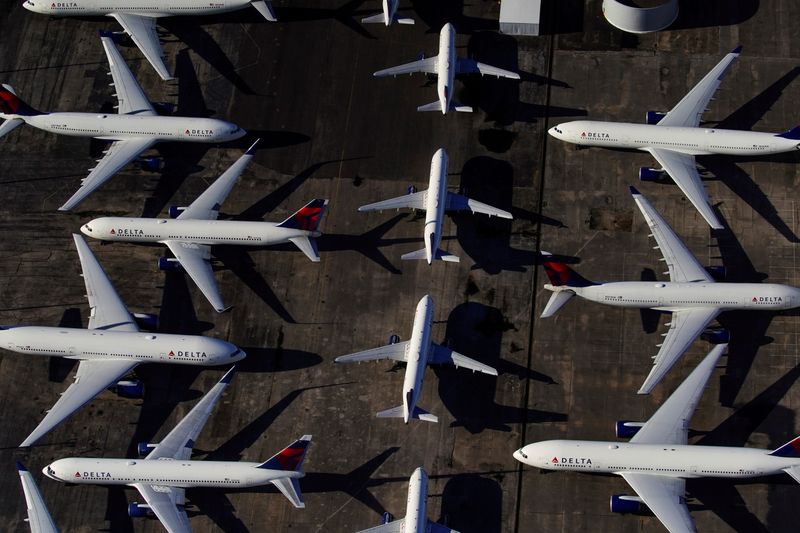By Tracy Rucinski and David Shepardson
CHICAGO/WASHINGTON (Reuters) - U.S. airlines are preparing to tap the government for up to $25 billion in grants to cover payroll in a sharp travel downturn triggered by the coronavirus, even after the government warned it may take stakes in exchange for bailout funds, people familiar with the matter said.
After the U.S. House of Representatives approves the airline bailout and President Donald Trump signs it as early as Friday, airlines are to receive initial payments within 10 days.
Treasury Secretary Steven Mnuchin can demand equity, warrants or other financial instruments in order to "provide appropriate compensation to the federal government." A Treasury spokeswoman declined to comment on a report that Mnuchin would demand equity.
Airlines can ask for the equivalent of their payroll between April 1 and Sept. 30 of last year, according to the terms of the bill, meaning some large airlines could get $4 billion or more in total.
Delta Air Lines (N:DAL), for example, paid roughly $5.6 billion in salaries and related costs over the last six months of 2019 to around 91,000 full-time employees, according to regulatory filings.
Despite the prospects of payroll grants, airlines including Delta have already moved to reduce employee costs through temporary voluntary unpaid leave and early retirements.
More than 17,000 Delta workers such as flight attendants have already volunteered for unpaid leave for 30, 60 or 90 days, and Chief Executive Ed Bastian has asked employees to work only three or four days a week between April and June to save around 25% in payroll costs, according to a memo seen by Reuters.
With operations sharply cut back, airlines' biggest expense right now is employee wages and the government grants give them around six months to reassess whether air travel demand is really returning.
In a company memo on Thursday, American Airlines Group Inc's (O:AAL) leaders said they were extending voluntary leave options to non-union employees after negotiating agreements with groups representing union jobs such as pilots and flight attendants.
"We are hopeful the uptake will be robust and are working hard to make sure all have the ability to continue employment, even if at reduced levels, while this crisis runs its course," Chief Executive Doug Parker and President Robert Isom told their employees.
American had around 133,000 full-time employees in 2019, about 85% of whom were unionized. Executives at American and Delta are also forgoing or cutting their pay.
Aside from the grants, airlines without other available financing options can also apply for $25 billion in loans and loan guarantees under the rescue package.
Some major airlines, which continued to tap debt markets this week while lobbying Washington for aid, have told U.S. officials they may skip the government loans entirely, people familiar with the discussions said.
The 5-year government loans would carry tougher terms than grants or loans from private banks, and could burden balance sheets just as companies are trying to recover from the crisis.
"However, if demand trends don't improve during the second half of 2020, we would not be surprised if some of the carriers began to express an interest in the loan program," Deutsche Bank (DE:DBKGn) analyst Michael Linenburg said in a note.
If they do, companies would have to restrict executive compensation and suspend dividend payments until 12 months after loan re-payment.
With the grants, limits on executive compensation would expire on March 24, 2022, and dividends and share buybacks can resume on Sept. 30, 2021.

Between loans and grants, American would be eligible for $12 billion, Parker said on Thursday. Despite uncertainty over exact funding conditions, he said he was "optimistic that the terms will not be onerous."